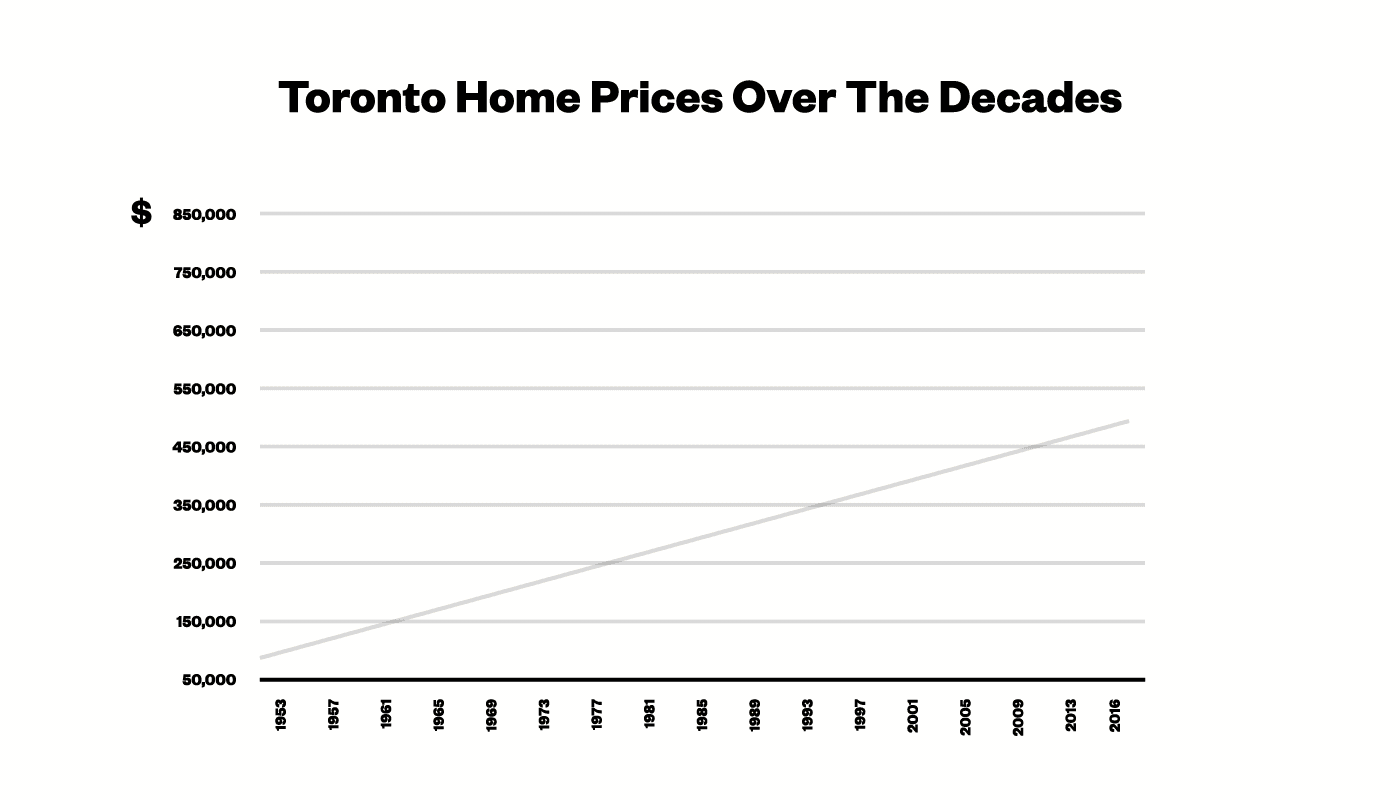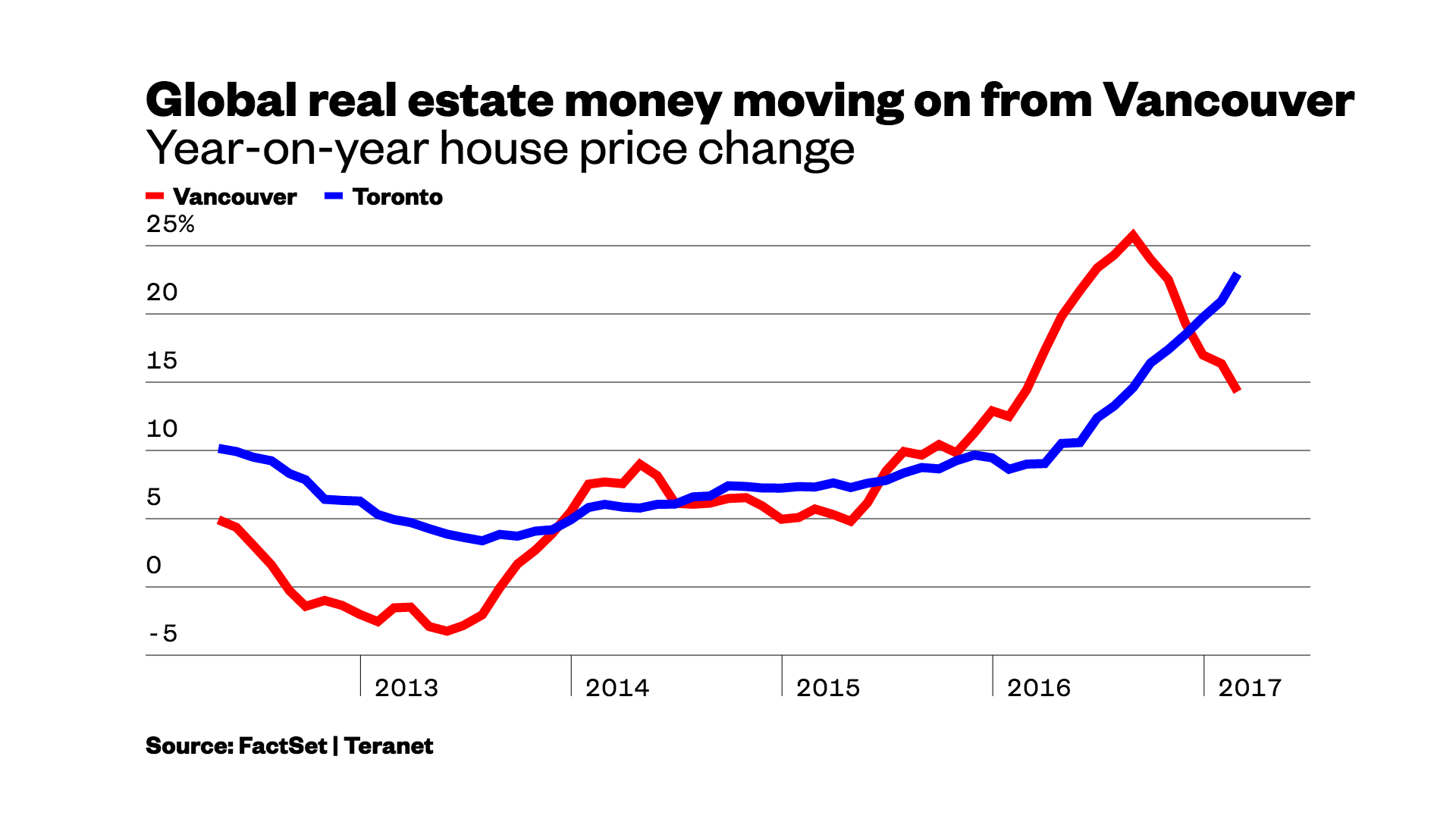The frenzy in Toronto’s real estate market is very real and very present. New data from the Toronto Real Estate Board (TREB) shows that home prices shot up a ridiculous 33 percent between March 2016 and March 2017. And we thought February’s data — a 27 percent year-over-year price hike — was shocking.The price of an average home in the Toronto area (that includes condominiums, houses, and townhouses) now stands at $916,567 up from approximately $688,000 in March 2016. Let’s just process that for a second — the average price of a home, in Canada’s biggest city, has spiked by more than 200 grand in just one year.There’s a whole load of flipping going on, according to mortgage broker Bruce Joseph of Anthem Mortgage Group. “Look, domestic speculators are buying real estate, holding it for a year, and selling. They are just looking for momentum growth to make big profits,” Joseph told VICE Money by phone from his office in Barrie.That’s definitely a key part of the story. In the last three month, Toronto’s real estate market has exploded, prompting bank CEOs and economists, conventionally cautious in their outlook to shift into panic gear.“Any lingering debate that Toronto is now in a bubble was put to rest by February’s cannonading 24 percent year-over-year rise in benchmark prices,” said BMO Capital Markets Chief Economist Douglas Porter in a report last month.“It’s not sustainable and not healthy,” Scotiabank’s head of Canadian banking, James O’Sullivan was quoted as saying at the bank’s annual shareholder meeting.“Evidence is building that speculative forces are growing deeper roots, which raises the risk that prices will move closer to the top end of that forecast in the absence of policy measures,” said TD Economist Beata Caranci in a report released a few weeks ago.Housing market bears like economist and author Hilliard MacBeth and short-seller Marc Cohodes have long warned about the extent to which speculation, both domestic and foreign, has been fueling Canadian real estate, particularly in Toronto and Vancouver. Their rhetoric was frequently scoffed at, and pegged as hyperbolic, but it is in fact not so different from the tune the big banks are singing to right now.Just take a look at the chart below. As you can see, real estate, has always been a boom-bust asset. There are peaks in prices, and there are troughs. But since 2009, because of sustained low interest rates, home prices in Toronto have continually climbed, which begs the question — when are we going to reach a peak? “It’s hard to tell,” says Joseph. On the one hand, he says, people are not selling yet because they aren’t sure when prices are going to go down. “But there are a whole bunch of people, older, middle-class Canadians mostly, taking the opportunity to downsize in this market. They’ve been in the same house for decades, and they know this is the time to cash out for their retirement.”Last August, the B.C. government imposed a 15 percent tax on foreigners purchasing property in the Metro Vancouver Area. Seven months later, we might be seeing some kind of effect of that tax on the Toronto real estate market. In December 2016, Vancouver homes sales were down more than 39.4 percent year-over-year, while Toronto home sales were up 8.6 percent.Basically, there’s speculation that foreigners, seeking to avoid a tax on purchasing real estate in Canada, have shifted their focus to Toronto.
“It’s hard to tell,” says Joseph. On the one hand, he says, people are not selling yet because they aren’t sure when prices are going to go down. “But there are a whole bunch of people, older, middle-class Canadians mostly, taking the opportunity to downsize in this market. They’ve been in the same house for decades, and they know this is the time to cash out for their retirement.”Last August, the B.C. government imposed a 15 percent tax on foreigners purchasing property in the Metro Vancouver Area. Seven months later, we might be seeing some kind of effect of that tax on the Toronto real estate market. In December 2016, Vancouver homes sales were down more than 39.4 percent year-over-year, while Toronto home sales were up 8.6 percent.Basically, there’s speculation that foreigners, seeking to avoid a tax on purchasing real estate in Canada, have shifted their focus to Toronto. “Foreign bidding on Toronto real estate is massive. It’s way higher than the five percent figure put out by the CMHC,” Joseph told VICE Money.“The nonresident buyer tax (unique to Vancouver) is having a much bigger impact on Toronto real estate than Ottawa’s mortgage rule changes (which applied to both cities),” BMO Senior Economist Robert Kavcic said in a note recently.The last housing market peak in Toronto took place in 1989, and ended in a seven year period of house price declines. Prices fell 39 percent between 1989 and 1996.Follow Vanmala on Twitter
“Foreign bidding on Toronto real estate is massive. It’s way higher than the five percent figure put out by the CMHC,” Joseph told VICE Money.“The nonresident buyer tax (unique to Vancouver) is having a much bigger impact on Toronto real estate than Ottawa’s mortgage rule changes (which applied to both cities),” BMO Senior Economist Robert Kavcic said in a note recently.The last housing market peak in Toronto took place in 1989, and ended in a seven year period of house price declines. Prices fell 39 percent between 1989 and 1996.Follow Vanmala on Twitter
Advertisement
Domestic Speculators
Advertisement
Bucking The Trend

The Vancouver Factor
